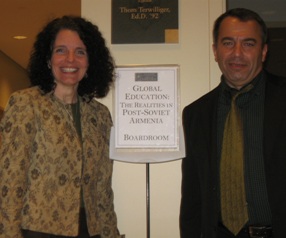Armenian Scholar Research Presentation

Dr. Gagik Demirjian, head of the Doctoral Department at the Gyumri State Pedagogical Institute in Armenia, spent six weeks of the fall semester at William & Mary as a visiting Fellow of the International Research and Exchange Board (IREX). His visit came as a result of participation in the University Administration Support Program, developed by IREX with the support of the Carnegie Corporation of New York.
Demirjian explained, "The program provides fellowships of six weeks at U.S. universities, empowering participants to directly analyze U.S. models and management culture and to consider solutions to management challenges we face in our home countries." The focus of his research was on creating a case study of the research management practices at the College of William and Mary. Demirjian worked closely with Dennis Manos, vice provost for research and graduate professional students, Stephen Hanson, vice provost for international affairs and director of the Reves Center for International Studies, and Jane Lopez, director of the Office of Sponsored Programs. The outcome of the onsite research project was to take back to Armenia a set of best practices to help develop a management infrastructure for research activities.
Pamela Eddy, an associate professor in the School of Education, served as Demirjian's host. In this role, she provided him with background on the US system of higher education and provided him with opportunities to learn more about the types of research conducted by the School of Education faculty, particularly in the areas of STEM and in the use of technology in teaching. Eddy noted, "The beauty of hosting scholars from other countries is the two-way learning that occurs. The visiting scholars learn about the US approach to higher education and our students discover how higher education is done around the world."
Dr. Demirjian conducted a research presentation titled, Global Education: The Realities in Post-Soviet Armenia. He reviewed the format of the university system and the changes underway after the years of oversight by the Soviets. The audience was diverse with participants having background in Soviet studies, having links to Armenia heritage, and having interest in comparative education.